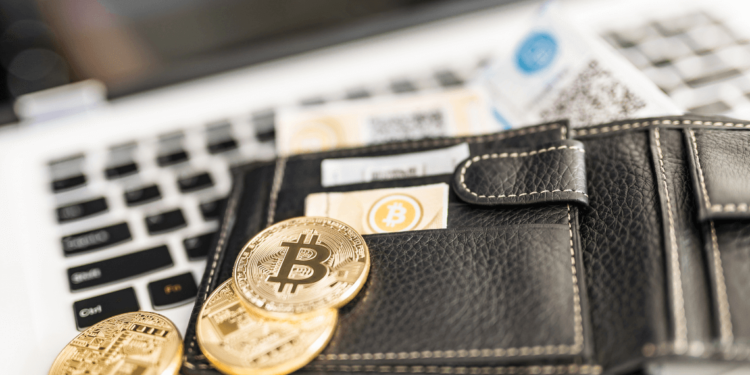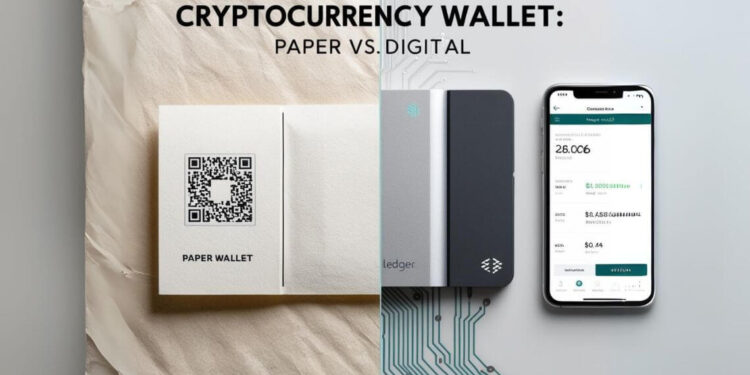Cryptocurrency wallets are important tools for anyone using digital money. They help keep your crypto safe and let you send or receive coins. In this guide, we’ll look at different types of wallets, focusing on paper wallets and newer options. We’ll talk about how to keep your crypto secure and how wallets have changed over time.
Key Takeaways
- Cryptocurrency wallets store private keys, not actual coins
- Hot wallets are connected to the internet, while cold wallets are offline
- Paper wallets are outdated and not recommended anymore
- Hardware wallets are the safest and easiest to use
- Software wallets are good for everyday use
- Always follow safety rules no matter what wallet you use
- You might want to use different wallets for different things
- Keep learning about new wallet technology

Understanding Cryptocurrency Wallets
A cryptocurrency wallet is a digital tool that lets you store, send, and receive digital money. These wallets don’t hold your coins. Instead, they keep the private keys that prove you own the cryptocurrency on the blockchain. The public key, which comes from the private key, is like your wallet address for getting money. Picking the right wallet is important for keeping your digital money safe and easy to use. Your choice will affect how safe your money is and how you can use different blockchain networks and apps.
Types of Cryptocurrency Wallets

There are two main types of cryptocurrency wallets: hot wallets and cold wallets. Each type has good and bad points, and they’re good for different things. Let’s look at them closely:
Hot Wallets
Hot wallets are connected to the internet and include:
- Online wallets: You can use these through web browsers. They’re easy to use for quick transactions but depend on the website’s security.
- Mobile wallets: These are apps on your phone that let you use your money easily when you’re out. They often let you scan QR codes to pay quickly.
- Desktop wallets: This is software on your computer that gives you full control over your keys, but you need to keep your computer very secure.
These wallets are handy for using your money often, but they can be hacked more easily. They’re good for keeping small amounts of crypto that you use regularly or for trading. Hot wallets often have extra features like built-in exchanges or connections to other crypto apps, making them useful for active crypto users.
Cold Wallets
Cold wallets keep your keys offline and include:
- Hardware wallets: These are physical devices that safely store your keys. They’re very secure because they keep your private keys separate from computers or phones that might be hacked.
- Paper wallets: These are physical documents with your keys written on them. They used to be popular but now they’re outdated because they have risks and are hard to use.
Cold wallets are safer but not as easy to use regularly. They’re best for storing large amounts of cryptocurrency that you don’t plan to use often. Cold wallets are hard to hack online, but you need to be careful about keeping them physically safe and having good backups.
The Rise and Fall of Paper Wallets
Paper wallets used to be thought of as the best way to store cryptocurrency, especially when Bitcoin was new. Let’s look at how they became popular and then outdated:
What is a Paper Wallet?
A paper wallet is a piece of paper with your cryptocurrency’s public and private keys printed on it. It usually has QR codes you can scan. People started using them as a way to store cryptocurrency completely offline, which protected it from digital threats.
Advantages of Paper Wallets
Paper wallets were completely offline, which protected them from online threats and malware. They couldn’t be hacked online because the keys were never on the internet. Users had full control over their keys without relying on other services. They were cheap to make, only needing paper and a printer. People could be creative with how they stored them, like laminating them or engraving them on metal.
Disadvantages and Risks
Paper wallets could be damaged by water, fire, or just wearing out, which could make you lose your money forever. They could be lost or stolen if not stored safely. They were hard to use for frequent transactions because you had to type in long keys manually. People could make mistakes when creating or using them, like typing keys wrong. There was no protection if someone accidentally saw the private keys. It was hard to manage many different cryptocurrencies or large amounts with paper wallets.
Current Status of Paper Wallets
Paper wallets were popular from 2010 to 2016, but now they’re considered old-fashioned and risky. Most experts don’t recommend using them anymore because of the risks and because there are safer options now. Most people in the crypto world have switched to hardware wallets and better software that’s safer and easier to use.
Modern Alternatives to Paper Wallets
Hardware Wallets
Hardware wallets are now considered the best way to store cryptocurrency. These physical devices have many advanced features that solve the problems of paper wallets:
- Better security with PIN protection and special chips that can’t be tampered with
- Offline storage of private keys, keeping the main benefit of cold storage
- Easy backup and recovery options, often using special phrases
- Support for many different cryptocurrencies on one device
- User-friendly interfaces for managing assets and making transactions
- Can work with software wallets to balance security and convenience
https://t.co/UsIC3xJj31— Dad Mode (@DadModeGG) November 28, 2024
Choosing a hardware wallet is often recommended if you have a lot of cryptocurrency. These devices are very secure against both online and many physical threats.
Software Wallets
Modern software wallets have also gotten better with improved security and ease of use:
- Two-factor authentication (2FA) for extra security
- Encrypted storage of private keys on your device
- Regular security updates to protect against new threats
- Easy-to-use interfaces with portfolio tracking and market data
- Can work with decentralized exchanges and DeFi platforms
- Multi-signature support for shared control of funds
- Customizable transaction fees and support for advanced features
Key Considerations When Choosing a Cryptocurrency Wallet
When picking a wallet for your digital money, think about these things to make sure you choose one that fits your needs and how much risk you’re okay with:
- Security features: Look for wallets with strong encryption, multi-factor authentication, and a good history of protecting users’ money.
- Ease of use: Think about how tech-savvy you are and choose a wallet with an interface you’re comfortable using.
- Supported cryptocurrencies: Make sure the wallet supports all the coins and tokens you want to hold or trade.
- Backup and recovery options: Check that the wallet has good backup methods and clear steps for getting your money back if you lose your device or it breaks.
- Development and updates: Choose wallets from trustworthy developers who regularly update their software to fix security issues and add new features.
- Community trust: Look at user reviews and what the community says to see if the wallet provider is reliable and has a good reputation.
- Integration with other services: If you want to use DeFi platforms or exchanges, look for wallets that work well with these.
- Control over private keys: Decide if you want full control over your private keys or if you’re okay with a service holding them for you.
Best Practices for Cryptocurrency Wallet Security
No matter what kind of wallet you choose, follow these security tips to keep your digital money as safe as possible:
- Use strong, unique passwords for all your wallets, and don’t use the same password for different things
- Turn on two-factor authentication when you can, preferably using hardware tokens or authenticator apps instead of text messages
- Keep your recovery phrase or seed words in a safe, offline place, maybe even on metal for durability
- Regularly update your wallet software to have the latest security fixes
- Be careful of phishing attempts and only download wallets from official sources, checking URLs and app signatures
- Consider using both hot and cold wallets for different purposes, balancing security and convenience
- Use hardware wallets for storing large amounts long-term, and software wallets for smaller amounts you use more often
- Learn about common scams and security threats in the cryptocurrency world
- Have a clear plan for what happens to your funds if something unexpected happens to you
Conclusion
Paper wallets used to be important in the early days of cryptocurrency, but now there are better and safer options. Today, using a mix of hardware wallets for long-term storage and software wallets for everyday use is the best way to balance security and convenience for most people. As cryptocurrency has grown up, so have the tools we use to manage our digital money. There are now solutions for all kinds of users with different security needs.
Remember, the world of cryptocurrency is always changing, and so are the tools we use to manage our digital money. Keep learning about new wallet technology and always prioritize keeping your investments safe. As blockchain technology keeps improving, we’ll probably see even more advanced and easy-to-use storage solutions that make digital assets even safer and easier to use.
As you start using cryptocurrency, take time to research and choose a wallet that’s right for you. Whether you’re just starting or you’ve been trading for a while, the right wallet will keep your digital money safe and easy to use. Think about your investment goals, how much risk you’re okay with, and how comfortable you are with technology when you’re choosing. Remember that the best wallet for you might change as you get more cryptocurrency and your needs change. Stay alert, keep learning, and be ready to change how you store your crypto as new technologies and best practices come out in this fast-changing field.















